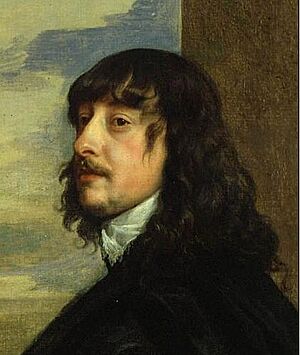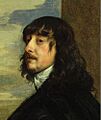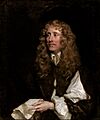Thomas Birch (English Parliamentarian) facts for kids
Quick facts for kids
Colonel
Thomas Birch
|
|
|---|---|
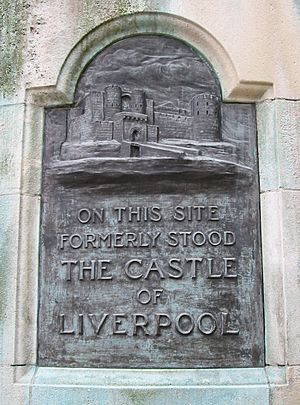
Plaque marking Liverpool Castle; Birch was Governor 1644 to 1655
|
|
| MP for Liverpool | |
| In office September 1656 (not allowed to take his seat) – February 1658 |
|
| Governor of Liverpool | |
| In office 1644–1655 |
|
| Deputy Lieutenant of Lancashire | |
| In office June 1642 – July 1650 |
|
| Personal details | |
| Born | 5 June 1608 Birch Hall, Rusholme |
| Died | 5 August 1678 (aged 70) Liverpool |
| Nationality | English |
| Spouse | Alice Brooke (died 1697) |
| Relations | Colonel John Birch (1615–1691) |
| Children | Five sons, five daughters |
| Parents | George and Ann Birch |
| Occupation | Puritan radical, soldier, landowner |
| Military service | |
| Allegiance | |
| Years of service | 1642 to 1660 |
| Rank | Colonel |
| Battles/wars |
|
Thomas Birch (born around June 5, 1608, died August 5, 1678) was an English landowner and soldier. He was a strong Puritan, a type of Protestant Christian. Thomas Birch fought for the Parliament during the Wars of the Three Kingdoms. He also served as a member of the House of Commons at different times between 1649 and 1658.
Thomas Birch came from a large Puritan family. Many of his relatives also fought in the Parliamentarian army. He helped Parliament take control of Lancashire during the First English Civil War. In 1642, he became a Deputy Lieutenant of Lancashire. This meant he helped lead the local military. In 1644, he was made Governor of Liverpool. Unlike many of his friends, who were moderate Presbyterians, Birch was closer to the religious Independents. This group included important figures like Oliver Cromwell.
After King Charles I was executed in 1649, the Commonwealth of England was formed. Thomas Birch became a very important political leader in Lancashire. However, he slowly started to disagree with Oliver Cromwell. Because of this, he lost his job as Governor in 1655. He was also not allowed to be part of the Second Protectorate Parliament. After the king returned to power in 1660, in what is known as the Stuart Restoration, Birch stopped his public work. He lived a quiet life in Liverpool until he died in 1678.
Contents
About Thomas Birch
Thomas Birch was born around June 5, 1608. His birthplace was Birch Hall in Rusholme, which is now part of Manchester. He was the oldest son of John Birch and Anne Hey. He also had a sister named Anne. His father passed away in 1611 when Thomas was only three years old. By 1641, his family's property made about £250 a year. This was a lot of money back then.
In 1623, Thomas Birch married Alice Brooke. She lived until 1697. They had ten children together. This included five sons: Thomas (1629–1700), George (who lived after 1697), Matthew, Andrew (1652–?), and his twin Peter (1652–1710). Peter later became a Tory and a priest in the Church of England. Their five daughters were Anne, Alice, Mary, Elena, and Deborah (who lived after 1710).
Thomas Birch's Military and Political Life
Not much is known about Thomas Birch's life before the First English Civil War began in 1642. He had many relatives in the Manchester area. Most of them were Presbyterians who supported the Parliamentarian side. This included his relative, Colonel John Birch. Even though most of North-West England supported the king (Royalists), Manchester was a strong Parliamentarian area. In June 1642, Birch was made a Deputy Lieutenant of Lancashire. He also gathered a group of soldiers to fight.
One of the first battles of the war happened on July 15. The Earl of Derby, a Royalist leader, tried to take weapons from Manchester. Thomas Birch stopped him. This started a rivalry between them that lasted until the Earl's death in 1651. On September 26, the Earl of Derby attacked Manchester. Birch was part of the soldiers who defended the city. They held out until the Royalists left on October 1. This victory made Parliament's supporters feel much better.
In December, Birch was promoted to major. He joined a group of soldiers led by Colonel Ralph Assheton. Assheton was a MP for Liverpool. Birch was there when Parliament's forces captured Preston in February 1643. This was an important victory. One of his fellow soldiers was George Booth. Booth later led a rebellion called Booth's Uprising in 1659.
In 1643, Birch joined the Lancashire Sequestration Committee. This group was in charge of fining Royalists. He also became a colonel of a group of soldiers. In June 1644, he was made governor of Liverpool. Soon after, Prince Rupert captured Liverpool. But after a big Royalist defeat in July, Liverpool was taken back in November. Birch was given 600 soldiers to protect the port. His soldiers also helped in the siege of Goodrich Castle in June 1646. This was one of the last battles of the First Civil War.
After the war, there were disagreements within Parliament. Most leaders in Lancashire were moderate Presbyterians. They included Ralph Assheton and others. They worried about the strong ideas of the religious Independents. This group included Congregationalists like Oliver Cromwell and Thomas Birch. However, when the Second English Civil War started in 1648, the Lancashire leaders stayed loyal to Parliament. They fought at Preston in August. The Earl of Derby still held the Isle of Man for King Charles I. Birch arrested the Earl's two daughters. He held them in Liverpool Castle to make sure the Earl behaved well.
Many moderate members of Parliament were upset when King Charles I was put on trial. He was executed on January 30, 1649. Thomas Birch's cousin John and Sir Richard Wynn, 2nd Baronet, who was MP for Liverpool, were removed from Parliament. This happened during an event called Pride's Purge in December 1648. Other leaders were also removed from the army. Birch was one of the few who kept his job. He became MP for Liverpool in October 1649. He was also made a colonel in the Lancashire army. For the next few years, he was the most important government official in the area.
In 1651, a Scottish army invaded England. The Earl of Derby landed in Lancashire. He planned to meet with King Charles II at Worcester. Thomas Birch helped a group of soldiers under Colonel Robert Lilburne. They defeated Derby's troops at Wigan Lane on August 25. The Earl escaped, but he was captured after the Battle of Worcester in September and executed. Birch and Robert Duckenfield were sent to take control of the Isle of Man. They finished this by early November.
Later Life and Retirement
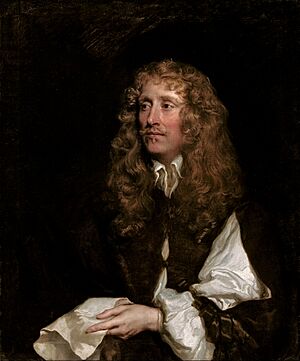
Liverpool did not have a representative in the 1653 Barebones Parliament. But Birch was re-elected as an MP in the next two Parliaments. These were the First and Second Protectorate Parliaments. Oliver Cromwell called the Second Parliament to approve taxes for the army. Birch, along with others, was not allowed to be part of this Parliament. This was because he opposed Cromwell's plans.
This showed that Birch was starting to agree more with his old friends. He was not elected to the 1659 Third Protectorate Parliament. Birch had been a strong supporter of the Commonwealth because of his religious beliefs. But it became clear his views were changing. In 1649, he took over a building that used to be a church in Manchester. In 1653, a rich merchant left money in his will for this building to become a charity school. This school is now Chetham's School of Music. In 1656, Birch helped a Presbyterian minister named Henry Newcome become the minister of what is now Manchester Cathedral.
In 1658, Oliver Cromwell died. His son Richard Cromwell took over, but he resigned in May 1659. The country became unstable. This led to Booth's Uprising in August. This was an attempt to bring back King Charles II. It was led by Sir George Booth, who had fought with Birch in the First English Civil War. The rebellion mostly happened in Cheshire. General Lambert quickly defeated it. Birch stayed neutral during this time. However, Henry Newcome encouraged his church members to join the rebellion. Liverpool also said it supported Booth.
Birch was seen as someone who might support the king. So, just before the king returned in May 1660, the new army leader made Birch a colonel. After King Charles II came back, Birch retired from public life. Because of his past strong beliefs, he was suspected of being involved in a plot in 1663. But there was no proof.
He might have been protected by his cousin John and other friends who were MPs. He followed the 1662 Act of Uniformity. This law required people to be members of the Church of England. However, he continued to support Non-conformist priests at Birch Chapel. One of these was Henry Finch, a famous Presbyterian preacher. Thomas Birch died at his home in Liverpool on August 5, 1678.
Images for kids
-
Plaque marking Liverpool Castle; Birch was Governor 1644 to 1655
-
Portrait of George Booth, 1st Baron Delamer, who led a rebellion in 1659.


